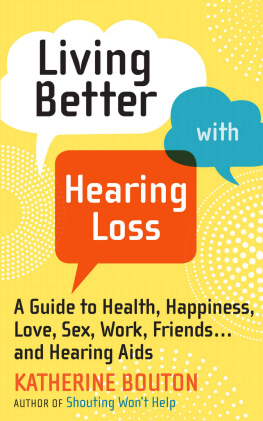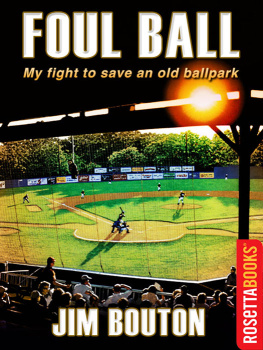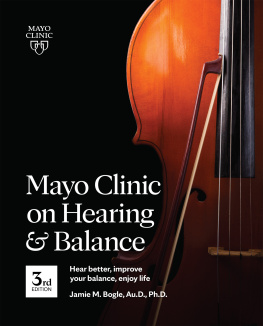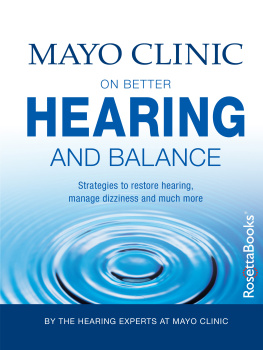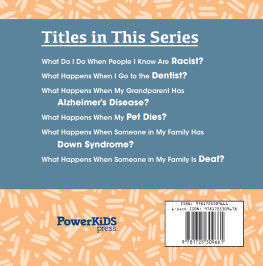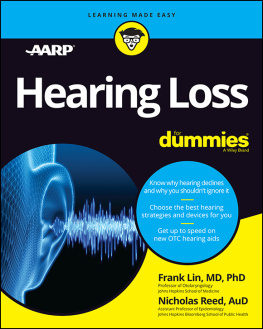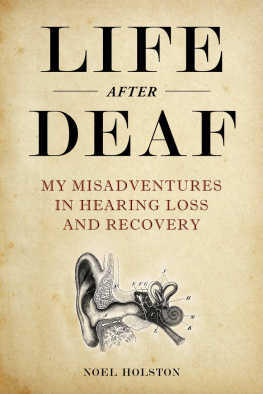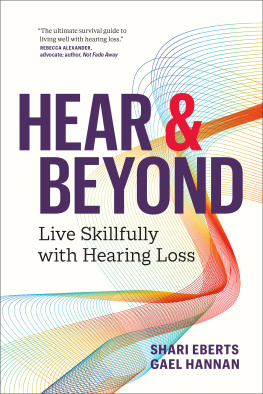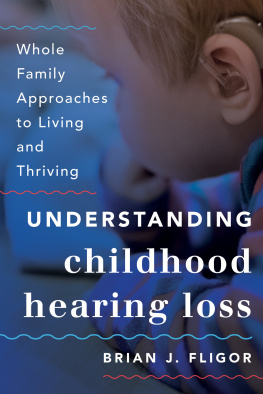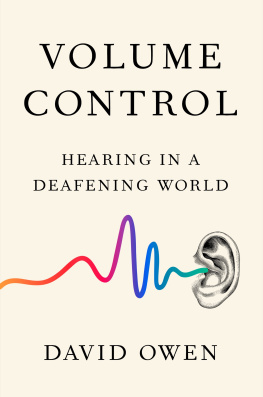Living Better with Hearing Loss
A Guide to Health, Happiness, Love, Sex, Work, Friends... and Hearing Aids
Katherine Bouton
Workman Publishing New York
Contents
Introduction
I had no idea it was possible for a thirty-year-old to lose most of the hearing in one ear overnight without any apparent explanation. But it happened to me. Back then, I didnt have an internist, much less an ear, nose, and throat (ENT) specialist. I certainly didnt know how to find an audiologist. Hearing aids were for old people, and anyway they didnt work.
Within a few years, the left ear loss had worsened and was joined by progressive loss in the right ear. Still, I stumbled through life, increasingly deafer with every year. By the time I got hearing aids twenty years later, I was seriously hard of hearing. And it took me another decade before I admitted to myself and finally to others that I had a disability, and that I needed help.
This is what my hearing loss feels likeeven with a cochlear implant and hearing aid:
Scenario #1
My husband sneezes in the next room.
What? I say.
Mumble mumble.
What?
I get up and go to the door of his office. What did you say? I ask impatiently.
He looks up from his computer. I didnt say anything.
Then what was that big loud noise?
I was just sneezing.
Scenario #2
The phone rings.
Ever optimisticor perhaps, ever in denialI pick it up.
Hello?
Hi, Mom. Its Will.
You want to talk to Will?
No, it is Will.
Will? Hes not here.
No, it is Will!
Can you text me?
Its only when I get the text that I realize Ive been talking to my son.
Scenario #3
Someone on the street calls, Taxi!
I turn around.
Taxi sounds like Katherine! to me.
Unfortunately, as these examples show, my hearing is far from perfectnot to mention far from normal, even with the hearing aid in my right ear and the cochlear implant in my left. In general, the best technology can restore hearing only partially when the loss is as severe as mine. This is something that people with normal hearing dont understand. Sometimes even audiologists dont understand it. Certainly, anyone getting a hearing aid for the first time expects that it will correct the hearing loss. Glasses work. Why shouldnt a hearing aid?
The mishaps described above are relatively harmless. My family is forgiving. But when I worked in a high-pressure job at The New York Times, the stakes were much higher. I never made a major error, but I was not an optimal colleague. Most of my coworkers didnt know I had hearing loss, and those who did had no idea how serious it was. But what they did knowwhen I failed to answer a question, or when I failed to respond to something theyd said, or when I asked a question that someone else had just asked, or made a comment that someone else had just madewas that something was off.
I was either a snob or stupid or aloof or bored or burned out.
I thought Id fooled my boss, too, and I had. His impression was that I was not a team player, and he pushed me out of my job.
Why We Ignore Hearing Loss
Most hearing loss comes on slowly, usually from noise exposure or aging. People may not even know they have a problem, because hearing tests are not routinely given at annual physicals. They may feel confused, and not notice missing certain sounds. Its easy to forget that the wind blowing in the trees is a sound, and not just a sight. Water running in the sink makes noise.
They cant hear in a noisy place, but they blame the placethis restaurant is too loud. Or they blame the speakershe mumbles, he has a mustache, a foreign accent, thin lips. It doesnt occur to them that the problem may be theirs, not someone elses.
We tend to ignore hearing loss because its so much easier than treating it. Once it becomes undeniable, we ignore it because we dont really know what to do about it. Most people dont know where to go for a hearing test. They dont know whether its an issue for their internist, an ENT, or an audiologist. Theyre not even sure its something they should treat or if its just a natural part of aging. It is a natural part of aging, the same way elevated cholesterol and blood pressure are, the same way an arthritic knee is. We treat the high cholesterol and high blood pressure, we do physical therapy for the arthritic knee. Why then do we simply accept hearing loss as inevitable?
Hearing loss is dismissed as a lifestyle problem. Or an attitude problem. We arent listening closely enough. We arent paying attention. Spousal hearing loss is a familiar joke: We hear what we want to and ignore the rest.
Even when they finally acknowledge the hearing loss and are told they would benefit from hearing aids, most people dont get them. Only a fraction of those Americans who could benefit from a hearing aid has one. Why dont people use hearing aids? The short answer is stigma, cost, and confusion.
Because its an invisible disability, hearing loss is easy for others to ignore, too. No one looks deaf. When I tell people I have hearing loss, and ask if they can speak more slowly, they dont know how to respond. Do I need a sign language interpreter, they ask? Can I show them the sign for Hello? I dont know sign language. I speak English and have for the past sixty-five years.
They also dont know how to talk to someone with hearing loss. They speak in an exaggerated way, or lean into my ear and talk (where I cant see their lips). I have to tell them how to talk to me. But without a visual clue to remind them of the hearing loss, they often quickly forget I ever mentioned it.
One reason hearing loss is so hard for people to comprehend is that we each experience it differently. There is no typical hearing loss. How a person with damaged ears hears depends on dozens of factors, among them the location of the loss (in the hair cells or elsewhere in the ear), the pattern (i.e., how different frequencies are affected), the length of time youve had it, the correction used, his or her particular success with the device, and how well the loss is tolerated emotionally. For some of us, everything is too loud (a condition called recruitment). Others can barely hear sounds. Some of us cant tell a dogs bark from a car backfire, a siren from children shrieking and laughing. Many of us can hear a sentence but not understand a word of it. Some of us are good lip-readers (called speech-reading these days). For others, the ability to speech-read is elusive.
Perhaps the most damaging perception is that hearing isnt that important. When you get old, you lose it. This is an attitude epitomized by the fact that Medicare doesnt cover the cost of hearing aids. Hearing, Medicare seems to be saying, is not essential for healthy aging. And people with hearing loss too often buy into that.
Why Ignorance Is Dangerous
When people learn I have hearing loss, they often say to me, Oh, me too! I cant hear anyone in a restaurant. But I dont need hearing aids.
They are wrong. The inability to hear speech in noise is not only one of the first signs of hearing loss, but it may be when you most need hearing aids. If you can preserve the hearing in that ear through the use of a hearing aid, you are also preserving the brains capacity to understand speech. If you ignore that hearing loss, you are depriving your brain of the stimulation it needs to keep on functioning.
We know now about brain plasticitythe brain changes according to the input it gets. If the speech pathways of the brain arent being used for speech, theyre taken over for some other function. The brain doesnt like idle synapses, and it will quickly find another use for them.

